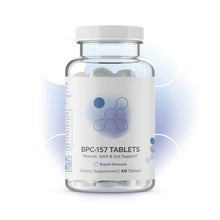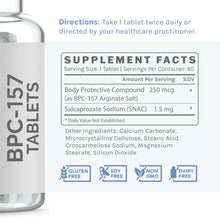Pickup available at 2857 Raleigh Road Parkway West
Usually ready in 2 hours
Infiniwell BPC-157 60 Tablets 250 mcg
-
2857 Raleigh Road Parkway West
Pickup available, usually ready in 2 hours2857 Raleigh Road Parkway West
Wilson NC 27896
United States+12522061636
Infiniwell BPC-157 is a partial sequence of body protection compound (BPC) found in human gastric juice. BPC works with your body to shore up normal digestive function.*
Oral BPC 157 tablets
BPC-157 is a peptide therapy that may have a number of POTENTIAL benefits, including:
-
Accelerated healingBPC-157 may help wounds, muscles, tendons, and nerves heal faster. It can also help with chronic conditions like tendonitis and muscle strains.reduced inflammation
-
BPC-157 can help with pain and swelling from conditions like arthritis and inflammatory bowel disease.Improved gut health
-
BPC-157 may help with digestive issues like ulcers, leaky gut syndrome, ulcerative colitis, and irritable bowel syndrome. Improved joint and bone health
BPC-157 may help heal damaged joints, cartilage, and bones. It may also help with conditions like osteoarthritis, rheumatoid arthritis, and osteoporosis.Improved cardiovascular health
Preliminary research suggests that BPC-157 may have benefits for cardiovascular health.Improved mental health
Preliminary research suggests that BPC-157 may have benefits for mental conditions like depression and anxiety.Improved brain cognition
BPC-157 may help improve brain cognition.Improved mood
BPC-157 may help improve mood by boosting serotonin production.
*Statements on this website have not been evaluated by the FDA. These products are not intended to diagnose, treat, cure or prevent any disease. If you are taking prescription medication, have a medical condition, or are pregnant or nursing, consult your physician prior to use. Not for children. Results may vary





